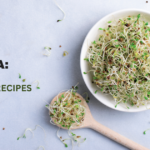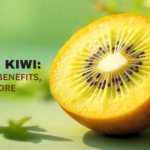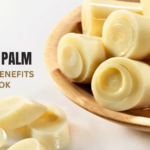Brussels sprouts (Brassica oleracea var. gemmifera) are tiny, round buds belonging to the cruciferous vegetable family, closely related to broccoli, kale, and cabbage. They grow on long stalks, with dense clusters of leaves forming heads that range from 1 to 2 inches in diameter. These vegetables are rich in nutrients and have become staples in modern diets due to their health benefits and adaptability to various cuisines.
Table of Contents
ToggleNutritional Powerhouse & Health Benefits
Brussels sprouts are packed with nutrients that make them an excellent addition to any diet. Here is an in-depth look at their nutritional profile:
- Rich in Vitamins: High in Vitamin C (boosts immunity) and Vitamin K (essential for bone health and blood clotting).
- Mineral Content: Contains manganese, potassium, and folate, which support heart and brain health.
- High in Fiber: Promotes digestive health and helps regulate blood sugar levels.
- Antioxidants: Contains kaempferol, an antioxidant that reduces inflammation and improves heart health.
- Low-Calorie: With only about 38 calories per cup, Brussels sprouts are ideal for weight management.
Read More: Spirulina 101: Nutritional Benefits, Uses, and Expert Tip
The Nutritional Profile of Brussels Sprouts
Brussels sprouts are nutrient-dense and low in calories, making them an excellent addition to any diet. According to the USDA Food Data Central (2023), 100 grams of raw Brussels sprouts contain:
- Calories: 43 kcal
- Protein: 3.4 grams
- Carbohydrates: 8.95 grams
- Fiber: 3.8 grams
- Vitamins: Vitamin C (147 mg, 163% DV) and Vitamin K (177 μg, 148% DV)
- Minerals: Potassium, manganese, and folate
- Antioxidants: Kaempferol and glucosinolates, which reduce oxidative stress and inflammation
Brussels sprouts rank among the top 20 most nutrient-dense vegetables, with an ANDI score of 490 out of 1000 (University of California Davis Nutrition Department, 2023).
Health Benefits of Brussels Sprouts
- Digestive Health: The fiber in Brussels sprouts supports gut microbiome health, promotes regular bowel movements, and reduces the risk of colorectal cancer by 27% (Harvard School of Public Health).
- Anti-Inflammatory Properties: Antioxidants like kaempferol and glucosinolates help lower inflammation, reducing the risk of chronic diseases and certain cancers.
- Immune Support: High Vitamin C levels boost white blood cell production and immunity.
- Heart Health: Recent studies from the American Heart Association highlight that Brussels sprouts support heart health through multiple mechanisms. Potassium and folate help regulate blood pressure and reduce cardiovascular risks.
- Weight Management: With a low caloric density, high satiety index, and significant fiber content, Brussels sprouts support healthy weight management.
- Cancer Prevention: Glucosinolates and isothiocyanates found in Brussels sprouts are studied for their potential to prevent certain types of cancer. Studies indicate that consuming Brussels sprouts 2-3 times weekly can decrease cancer risk by up to 32%. The antioxidant kaempferol, abundant in these vegetables, is crucial in reducing oxidative stress and inflammation.
Potential Downsides
- Digestive Issues: Overconsumption can cause bloating and gas due to raffinose, a complex sugar.
- Allergies: Rare cases of sensitivity to cruciferous vegetables have been reported.

The History and Origins of Brussels Sprouts
Brussels sprouts trace their roots to Ancient Rome, where similar vegetables were cultivated. However, modern Brussels sprouts originated in Belgium during the 13th century, gaining their name from the Brussels region. By the 16th century, they spread across Europe and later to the Americas. Archaeological evidence from Belgium’s University of Ghent confirms their long-standing cultural significance.
Read More: What a Nutritionist Says About Acai’s Health Benefits
Growing and Harvesting Brussels Sprouts
Optimal Growing Conditions
- Soil Requirements: Fertile, well-drained soil with a pH of 6.0-6.8.
- Sunlight: Full sun exposure for at least 6-8 hours daily.
- Temperature: Ideal range is 60-65°F (15-18°C).
- Planting Seasons: Early spring or late summer for a fall harvest.
Harvesting Techniques
- Signs of Readiness: Bright green, firm heads measuring 1-2 inches in diameter.
- Process: Start at the base of the stalk and twist or cut sprouts off.
Post-Harvest Storage Tips
- Store fresh sprouts in a perforated plastic bag in the refrigerator at 32°F (0°C) with 95-100% humidity for up to 1 week.
- Avoid washing before storage to prevent moisture-induced spoilage.
Cooking Brussels Sprouts Like a Pro
Popular Cooking Methods
- Roasting: Enhances natural sweetness and caramelizes the outer layers.
- Steaming: Retains nutrients and creates a tender texture.
- Sautéing: Adds flavor with minimal cooking time.
- Boiling: Quick but can lead to overcooking if not monitored.
- Grilling: Imparts a smoky flavor, perfect for summer dishes.
Recipe Ideas
- Classic Roasted Brussels Sprouts:
- Toss sprouts with olive oil, salt, and pepper.
- Roast at 400°F (200°C) for 25–30 minutes.
- Brussels Sprout Salad:
- Shred raw sprouts and mix with cranberries, walnuts, and a tangy vinaigrette.
- Brussels Sprouts Stir-Fry:
- For an Asian-inspired dish, Sauté sprouts with garlic, soy sauce, and sesame oil.
Flavor Pairings
- Ingredients: Pair with balsamic vinegar, garlic, bacon, or parmesan.
- Spices and Herbs: Use rosemary, thyme, or smoked paprika for added depth.
Mistakes to Avoid
- Overcooking: This leads to a mushy texture and sulfurous odor.
- Skipping Seasoning: Lack of seasoning can result in bland sprouts.
- Crowding the Pan: Prevents proper caramelization during roasting.
Beginner-Friendly Recipes
- Classic Roasted Brussels Sprouts: Toss with olive oil, salt, and pepper; roast at 400°F for 25 minutes.
- Brussels Sprout Salad: Shred raw sprouts and mix with cranberries, walnuts, and a tangy dressing.
- Sautéed Sprouts with Garlic: Cook sprouts in olive oil with minced garlic for a quick side dish.
Best Way to Roast Brussels Sprouts
Roasting Brussels sprouts is one of the most popular and flavorful ways to prepare this nutrient-rich vegetable. Proper roasting brings out their natural sweetness, balances their earthy flavor, and creates a crispy, caramelized exterior. Here’s a step-by-step guide to achieve perfectly roasted Brussels sprouts every time.
Read More: The Complete Guide to Holistic Health Coaching
Ingredients:
- 1 pound Brussels sprouts
- 2 tablespoons olive oil
- 1 teaspoon sea salt
- ½ teaspoon freshly ground black pepper
- Optional: Garlic powder, smoked paprika, or red pepper flakes for extra flavor
Preparation:
- Select Fresh Brussels Sprouts:
- Choose sprouts that are firm, bright green, and free of blemishes.
- Smaller sprouts are typically sweeter and more tender, while larger ones may have a stronger flavor.
- Trim and Prepare:
- Rinse the Brussels sprouts thoroughly under cold water to remove any dirt or debris.
- Trim the stem ends and peel away any yellow or damaged outer leaves.
- Slice them in half lengthwise for even cooking if the sprouts are large, quarter them for better results.
- Preheat the Oven:
- Set your oven to 400°F (200°C). A hot oven is essential for achieving a crispy, caramelized exterior.
- Season the Sprouts:
- Toss the Brussels sprouts with olive oil, salt, and pepper in a large mixing bowl.
- Make sure each piece is evenly coated with the oil for optimal roasting.
Roasting Process:
- Spread Evenly on a Baking Sheet:
- Arrange the Brussels sprouts cut side down on a large baking sheet. Avoid overcrowding, as this will cause them to steam instead of roast.
- Use parchment paper or a nonstick baking sheet for easier cleanup.
- Roast in the Oven:
- Place the baking sheet in the oven’s center and roast for 20-25 minutes.
- Halfway through cooking, stir or flip the sprouts to ensure even browning.
- Check for Doneness:
- The sprouts are ready when golden brown and tender when pierced with a fork. The outer leaves should be crispy and caramelized.
Optional Additions and Variations:
- Parmesan Cheese: Sprinkle-grated Parmesan over the sprouts during the last 5 minutes of roasting.
- Balsamic Glaze: Drizzle balsamic reduction or glaze over the finished sprouts for a tangy-sweet finish.
- Bacon: Add chopped, pre-cooked bacon to the baking sheet before roasting for extra flavor.
- Herbs: Toss with fresh thyme, rosemary, or parsley after roasting for an herbal boost.
Serving Suggestions:
- Side Dish: Serve alongside roasted chicken, grilled salmon, or steak.
- Salad Topping: Add roasted sprouts to a mixed greens salad with dried cranberries and goat cheese.
- Bowl Component: Pair with quinoa, roasted sweet potatoes, and avocado for a hearty grain bowl.
Tips for Perfectly Roasted Brussels Sprouts:
- Don’t Overcrowd the Pan: Ensure the sprouts are in a single layer and spaced apart.
- Use High Heat: A temperature of 400°F or higher is necessary to achieve caramelization.
- Experiment with Flavors: Add honey, maple syrup, or chili flakes for a creative twist.
Brussels Sprouts in Global Cuisines
- Asian: Used in stir-fries with soy sauce, sesame oil, and ginger.
- Italian: Featured in pasta dishes and as pizza toppings.
- European: Roasted with bacon, chestnuts, or butter.
Myths and Misconceptions
- Bitterness: The bitterness comes from glucosinolates. Roasting or pairing with sweet ingredients can reduce this.
- Gas and Digestive Concerns: Gradual dietary introduction and proper cooking methods minimize discomfort.
Storing and Preserving Brussels Sprouts
Freezing Brussels Sprouts
- Blanch for 3 minutes in boiling water.
- Cool immediately in ice water.
- Store in airtight bags at -20°F (-29°C) for up to 12 months.
Using Leftovers
- Add to salads, soups, or grain bowls.
- Transform into chips by thinly slicing, seasoning, and baking.
Brussels Sprouts in Special Diets
- Keto and Paleo: Low-carb and fully compliant.
- Vegan and Vegetarian: A complete protein when combined with grains.
- Low-FODMAP: Safe in portions under 38 grams.
Special Diets and Brussels Sprouts
Ideal for:
- Vegans and Vegetarians: A nutrient-dense plant-based option.
- Low-Carb Diets: Fits well into ketogenic and paleo diets.
- Gluten-Free Diets: Naturally gluten-free and versatile.
Who Should Avoid:
- Individuals with Thyroid Issues: High consumption may interfere with iodine absorption.
- Those on Blood Thinners: High Vitamin K content may affect medication.
Brussels Sprouts as an Immune-Boosting Food
Rich in Vitamin C and antioxidants, Brussels sprouts help:
- Protect against seasonal illnesses.
- Combat oxidative stress in cells.
- Enhance skin health.
Conclusion
Brussels sprouts are a versatile and nutritious vegetable with a rich history and cultural significance. Their benefits are numerous, from supporting digestion to enhancing heart health and immunity. You can enjoy their full flavor and nutritional potential by understanding their optimal growing, cooking, and storage methods. Whether roasted, steamed, or sautéed, Brussels sprouts are a delicious and healthy addition to any meal, offering countless culinary possibilities across global cuisines.

I’m Himani, a Singapore-based health coach certified by IIN. I help clients create personalized nutrition and lifestyle plans that lead to lasting health goals. By focusing on individual needs, I provide actionable steps to support your journey to optimal well-being











